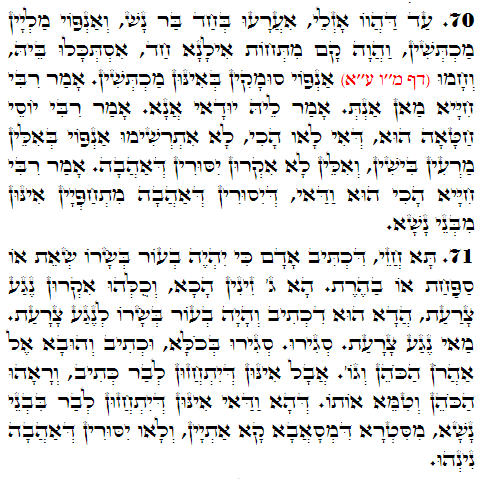Daily Zohar # 3009 – Tazria – When love hurts…
Daily Zohar 3009
Daily Zohar 3009

.
Hebrew translation:
71. בֹּא רְאֵה, שֶׁכָּתוּב אָדָם כִּי יִהְיֶה בְעוֹר בְּשָׂרוֹ שְׂאֵת אוֹ סַפַּחַת אוֹ בַהֶרֶת. הִנֵּה שְׁלֹשָׁה מִינִים כָּאן, וְכֻלָּם נִקְרָאִים נֶגַע צָרַעַת. זֶהוּ שֶׁכָּתוּב וְהָיָה בְעוֹר בְּשָׂרוֹ לְנֶגַע צָרָעַת. מַה זֶּה נֶגַע צָרָעַת? הַסְגָּרָה, הַסְגָּרָה בַּכֹּל, וְכָתוּב וְהוּבָא אֶל אַהֲרֹן הַכֹּהֵן וְגוֹ’. אֲבָל אוֹתָם שֶׁיֵּרָאוּ לַחוּץ, כָּתוּב וְרָאָהוּ הַכֹּהֵן וְטִמֵּא אֹתוֹ. שֶׁהֲרֵי וַדַּאי אוֹתָם שֶׁיֵּרָאוּ בַחוּץ בִּבְנֵי אָדָם, הֵם בָּאִים מִצַּד הַטֻּמְאָה, וְאֵינָם יִסּוּרִים שֶׁל אַהֲבָה.
72. אָמַר רַבִּי יוֹסֵי, מִנַּין לָנוּ? אָמַר רַבִּי חִיָּיא, שֶׁכָּתוּב (משלי כז) טוֹבָה תּוֹכַחַת מְגֻלָּה מֵאַהֲבָה מְסֻתָּרֶת. אֵיזוֹהִי תוֹכַחַת מֵאַהֲבָה? (זוֹהִי תוֹכַחַת מֵאַהֲבָה כַּאֲשֶׁר הִיא) מְסֻתָּרֶת מִבְּנֵי אָדָם. כְּמוֹ זֶה מִי שֶׁמּוֹכִיחַ אֶת חֲבֵרוֹ בְּאַהֲבָה, צָרִיךְ לְהַסְתִּיר דְּבָרָיו מִבְּנֵי אָדָם, שֶׁלֹּא יִתְבַּיֵּשׁ מֵהֶם חֲבֵרוֹ. וְאִם דְּבָרָיו הֵם בְּגָלוּי לִפְנֵי בְּנֵי אָדָם, אֵינָם בְּאַהֲבָה.
73. כָּךְ הַקָּדוֹשׁ בָּרוּךְ הוּא, כְּשֶׁמּוֹכִיחַ אֶת הָאָדָם, בַּכֹּל הוּא מוֹכִיחַ בְּאַהֲבָה. בָּרִאשׁוֹנָה מַכֶּה אוֹתוֹ בְּגוּפוֹ בִּפְנִים. אִם חוֹזֵר בּוֹ – מוּטָב, וְאִם לֹא – מַכֶּה אוֹתוֹ תַּחַת לְבוּשׁוֹ, וְאֵלּוּ (בְּעוֹרוֹ) נִקְרָאִים יִסּוּרִים שֶׁל אַהֲבָה. אִם חָזַר בּוֹ – מוּטָב, וְאִם לֹא – מַכֶּה אוֹתוֹ בְּגָלוּי בְּפָנָיו, לִפְנֵי כֻלָּם, כְּדֵי שֶׁיִּסְתַּכְּלוּ בוֹ וְיֵדְעוּ שֶׁהִנֵּה הוּא חוֹטֵא, וְלֹא אָהוּב שֶׁל רִבּוֹנוֹ הוּא.
.
Zohar Tazria
I’v added two more paragraphs to this study because they are connected to the same lesson.
#70
While they were walking Rabbi Yosei and Rabbi Chiya came across a man that rose up from under a tree, and his face was red and full of bruises. They asked him who he is and he replied that he is a Jewish man. Rabbi Yosei said that this person is a sinner because otherwise the effect of his sins wouldn’t be ‘registered’ on his face. His sufferings are not coming from love. Rabbi Chiya confirmed the words of his friend, adding that pains from love are not visible to people.
#71
Leviticus 13:2,3
“אָדָם כִּי יִהְיֶה בְעוֹר בְּשָׂרוֹ שְׂאֵת אוֹ סַפַּחַת אוֹ בַהֶרֶת וְהָיָה בְעוֹר בְּשָׂרוֹ לְנֶגַע צָרָעַת וְהוּבָא אֶל אַהֲרֹן הַכֹּהֵן אוֹ אֶל אַחַד מִבָּנָיו הַכֹּהֲנִים”
“וְרָאָה הַכֹּהֵן אֶת הַנֶּגַע בְּעוֹר הַבָּשָׂר וְשֵׂעָר בַּנֶּגַע הָפַךְ לָבָן וּמַרְאֵה הַנֶּגַע עָמֹק מֵעוֹר בְּשָׂרוֹ נֶגַע צָרַעַת הוּא וְרָאָהוּ הַכֹּהֵן וְטִמֵּא אֹתוֹ.”
“When a man has on the skin of his body a swelling or a scab or a bright spot, and it becomes an infection of leprosy on the skin of his body, then he shall be brought to Aaron, the priest or one of his sons the priests.”
“The priest shall look at the mark on the skin of the body, and if the hair in the infection has turned white and the infection appears to be deeper than the skin of his body, it is an infection of leprosy; when the priest has looked at him, he shall pronounce him unclean.”
We read that there are three types of visible skin issues that brought to the priests. They are all under the category of ‘infection of leprosy.’ After the priest sees the infection, he announces that the person is impure. The Zohar explains that we learn from this that the visible infections and sufferings come from the sins and impurities of the person. If it’s visible, then the sufferings don’t come from love.
#72
The Zohar quotes the following verse that reveals that suffering from love are concealed.
Proverbs 27:5
“טוֹבָה תּוֹכַחַת מְגֻלָּה מֵאַהֲבָה מְסֻתָּרֶת”
“Better is open rebuke Than love that is concealed.”
When the rebuke comes from love, it is concealed like a matter between friends. A good person rebukes his friend quietly and not in public to avoid shaming him. If he rebukes him in public, then it doesn’t come from love.
#73
When the Holy One Blessed be He wish to correct a person, he starts with love, doing something ‘soft’ like a short illness or pain to wake up this person to correct his ways. If the person repents then all is well. If the ‘message’ was not received, then the inflicted pain grows. It becomes visible to the person but not to others. It is like some pain under his clothes. If it didn’t change the person, then God inflicts pain that visible in public so everyone could see that he sinned and became impure.
Lesson;
The lesson is clear. We need to be sensitive to what’s happening in our lives. If something is out of the norm to happen to us, then we should check our actions and make immediate corrections to ‘pay’ for whatever we did wrong and erase the ‘case’ from our ‘file.’ We do not want to accumulate ‘corrections’ and pay with greater sufferings.
If a person goes through long time issues/sufferings, it could be a carry-over from previous lives. People with such experience should be strict on their actions and keep study every day to maintain a continuous flow of light into his life wiping past debts gradually.
{||}

 Previous: Tazria
Previous: Tazria
